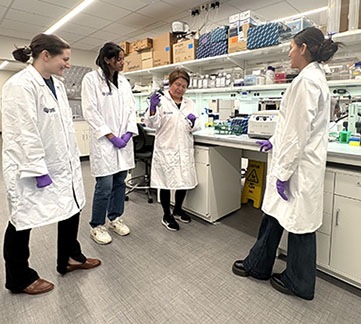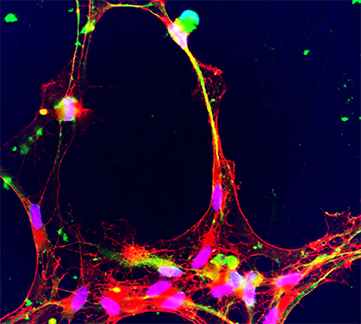


Welcome to the Smith Lab!
The Smith Lab research focuses on investigating the molecular pathogenesis and identifying novel biomarkers and therapeutics of neurodegenerative and obesity related disorders.
The Smith Lab research goals are to elucidate the molecular signaling pathways of these disorders, to identify biomarkers for disease process and treatment evaluation, to identify drug targets and to develop new therapeutics for treatment and prevention. The ultimate goal is to combat these diseases to benefit patients and families.

Wanli W. Smith, M.D., Ph.D.
Titles
- Director, Cellular Neurobiology Laboratory
- Professor of Psychiatry and Behavioral Sciences
- Professor of Pharmacology and Molecular Sciences
- Graduate School Faculty Member:
- Cellular and Molecular Medicine
- Pharmacology and Molecular Sciences
Research Interests
- Parkinson's disease
- Alzheimer’s disease
- Huntington’s disease
- Neuronal cell death
- Protein aggregation
- Obesity and other metabolic disorders
Papers
Research Overview
-
The Smith lab pioneered the neurobiology research to understand the role of the LRRK2 gene product in PD pathogenesis. Her group has revealed the roles for both LRRK2 kinase and GTP binding activities mediating mutant LRRK2-induced neurodegeneration and identified LRRK2 interaction with Parkin and synphilin-1. Her group generated the first Drosophila LRRK2-PD model, LRRK2 transgenic mouse model, and the combined gene/environment interaction mouse models. These LRRK2 based PD models have been widely used by others in the field to study pathogenesis and therapeutics. Her group identified the first generation of LRRK2 GTP binding inhibitors and several LRRK2 kinase functions, but also can reduce PD-linked mutant LRRK2-induced neuronal degeneration and neuroinflammation in cultured neurons and in inhibitors, which can block LRRK2 GTP binding activity and reduce LRRK2 kinase activity. These LRRK2 inhibitors not only provide pharmacological tools to dissect LRRK2 mouse brains of LRRK2 PD models, but the LRRK2 inhibitors also provide the lead compounds for potential development of disease-modifying therapeutic agents for PD intervention.
The Smith lab’s research illustrates the cellular pathways underlying mutant alpha-synuclein (another major genetic player in PD)–induced neuronal degeneration and protein aggregation, and identified protein interactions between alpha-synuclein, synphilin-1 and parkin. Her group has studied the genetic mutation and environmental stress interaction in alpha-synuclein toxicity and found that oxidative stress increases alpha synuclein phosphorylation, thereby increasing protein inclusion formation. Her team also studies other PD associate genes (e.g., TMEM230), and has found that overexpression of mutant TMEM230 induced a PARP-mediated apoptotic pathway. Moreover, the lab found overexpression of mutant TMEM230 or knockdown of endogenous TMEM230 induced neurodegeneration and impaired mitochondria transport at the retrograde direction in axons. These findings help to understand the cellular mechanisms of neurodegeneration and protein aggregation underlying PD pathogenesis.
-
The Smith lab has major contributions in understanding of synphilin-1 neurobiology and its roles in obesity pathogenesis. The lab generated the synphlin-1 transgenic mice, and unexpectedly found overexpression synphilin-1 induced obesity-like phenotypes in mice. Her group was the first to report that synphlin-1 is expressed in hypothalamus neurons and regulates food intake and bodyweight, and that synphilin-1 binds with AMPK (an energy censor in cells) and up-regulates AMPK-linked signaling pathways and cellular ATP levels, thereby by fostering energy balance. Moreover, her group generated human transgenic synphilin-1 Drosophila model for pathogenesis and therapeutic studies of obesity and related disorders.
-
The Smith lab has made contributions to understand the molecular pathways in Aβ peptide-induced neurodegeneration. Her group identified that Shc66, JNK and cdk5 signaling pathways play the critical roles in Aβ toxicity, and blocking these pathways significantly protects against neurodegeneration in AD models. Her team has used MRI techniques to identify neuroimaging biomarkers using AD animal models. In collaboration with others, her group has also investigated the pathogenesis and develop the therapeutics for cancer and osteoporosis.
Contact the Smith Lab Team
600 N. Wolfe Street
CMSC 5105
Baltimore, MD 21287
Phone: 410-502-0785
Fax: 410-614-0017
Email: wsmith60@jhmi.edu



